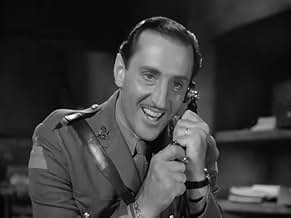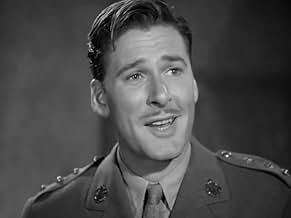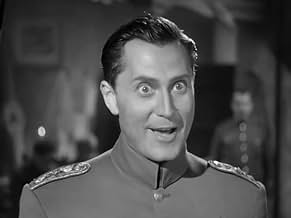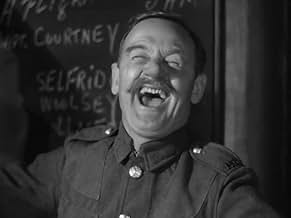CALIFICACIÓN DE IMDb
7.5/10
3.6 k
TU CALIFICACIÓN
Agrega una trama en tu idiomaBritish flying aces in World War I contend with the harsh realities of war.British flying aces in World War I contend with the harsh realities of war.British flying aces in World War I contend with the harsh realities of war.
- Dirección
- Guionistas
- Elenco
- Premios
- 2 premios ganados en total
Sidney Bracey
- Major Brand's Orderly
- (as Sidney Bracy)
Hal Brazeale
- Gregory
- (sin créditos)
Tyrone Brereton
- Orderly
- (sin créditos)
Richard Deane
- 'B' Flight Replacement
- (sin créditos)
Opiniones destacadas
This is a stirring and exciting story of the courage shown by pilots who know they or their friends will likely be killed on one of their missions, and the anguish their commanders feel when sending them to their deaths. Set on the battlefields of WWI, the plot duplicates the 1930 version starring Douglass Fairbanks, Jr. In fact, whole sequences (especially flying scenes and the climactic attack) were lifted directly from the earlier film. (Note: although the 1930 version was originally entitled "Flight Command," and is occasionally screened under that title by TCM, IMDb also calls it "Dawn Patrol," probably to distinguish it from the 1940 Robert Taylor "Flight Command" about Navy pilots.)
Although it's a close call, I would recommend this later film over its predecessor, for the superior performances of the lead actors. Errol Flynn (as Dick Courtney) was more involving than 1930's Richard Barthelmess, a veteran actor whose performance retains the somewhat stilted quality of the silent film era. While Douglas Fairbanks Jr. was excellent in the 1930 version as pilot Doug Scott, David Niven in the same role positively sparkles in several more light-hearted, even comedic scenes. And although Neil Hamilton played Major Brand well in the original film, at least early on in the story, the role calls for a less-sympathetic performance, and who could be less sympathetic than Basil Rathbone at his sneery best?
Furthermore, current (as of 2012) releases of 1930's "Flight Command / Dawn Patrol" are not as visually clear in all scenes as the later version, and also have a lot of scratchy sounds and low rumble in the soundtrack, which are especially distracting in quieter scenes. Hopefully, remastered versions of both films will someday be available.
Still, this is only nit-picking, as both the 1930 and 1938 versions of "Dawn Patrol" are excellent. But given the choice, go with Flynn and Niven of 1938.
Although it's a close call, I would recommend this later film over its predecessor, for the superior performances of the lead actors. Errol Flynn (as Dick Courtney) was more involving than 1930's Richard Barthelmess, a veteran actor whose performance retains the somewhat stilted quality of the silent film era. While Douglas Fairbanks Jr. was excellent in the 1930 version as pilot Doug Scott, David Niven in the same role positively sparkles in several more light-hearted, even comedic scenes. And although Neil Hamilton played Major Brand well in the original film, at least early on in the story, the role calls for a less-sympathetic performance, and who could be less sympathetic than Basil Rathbone at his sneery best?
Furthermore, current (as of 2012) releases of 1930's "Flight Command / Dawn Patrol" are not as visually clear in all scenes as the later version, and also have a lot of scratchy sounds and low rumble in the soundtrack, which are especially distracting in quieter scenes. Hopefully, remastered versions of both films will someday be available.
Still, this is only nit-picking, as both the 1930 and 1938 versions of "Dawn Patrol" are excellent. But given the choice, go with Flynn and Niven of 1938.
Clear eyed depiction of the cost and dangers for bombers during wartime. Errol Flynn is very good, a reminder that he was excellent not only in period pictures and westerns but quite capable in modern dress dramas. Strong supporting cast helps with Basil Rathbone standing out as a man who understands but is troubled by the weight of his duty even while others do not and is compassionate enough when the that weight has shifted to offer solace. David Niven's star moved much higher with his performance here, it would still be a few years before he moved into the top ranks but he was done with unimportant roles from this point on. Goulding's direction is steady and assured.
Warner Brothers more than most of the other major studios had a habit of simply recycling the old plots of their films and repackaging them. A good example would be the boxing film Kid Galahad remade a few years later as The Wagons Roll at Night with the setting now changed to a circus. But in this case we didn't get a remake of The Dawn Patrol, we got practically a carbon copy.
I finally saw the original The Dawn Patrol that was made in 1930 by Howard Hawks and found that this film was practically a word for word remake of the Hawks classic. Of course it was no surprise to learn that all the aviation sequences were just lifted bodily from the first film, but probably more than that was done. Several long-shots looked exactly the same.
In a way this might have worked out because director Edmund Goulding who was not known for action films could concentrate on the actors and he got very good performances out of Errol Flynn, David Niven, and Basil Rathbone who step into the parts that Richard Barthelmess, Douglas Fairbanks, Jr., and Neil Hamilton did the first time around.
Still after seeing first one version, than the other, one might be complaining of double vision at that.
I finally saw the original The Dawn Patrol that was made in 1930 by Howard Hawks and found that this film was practically a word for word remake of the Hawks classic. Of course it was no surprise to learn that all the aviation sequences were just lifted bodily from the first film, but probably more than that was done. Several long-shots looked exactly the same.
In a way this might have worked out because director Edmund Goulding who was not known for action films could concentrate on the actors and he got very good performances out of Errol Flynn, David Niven, and Basil Rathbone who step into the parts that Richard Barthelmess, Douglas Fairbanks, Jr., and Neil Hamilton did the first time around.
Still after seeing first one version, than the other, one might be complaining of double vision at that.
This is an extremely well-made WWI aviator film. The flying sequences are excellent and realistic, the story keeps your attention throughout, the direction is good and the actors are at their best. This is a great example of the type of movies Warner Brothers was capable of making--maybe not quite as elegant as those from MGM, but certainly highly entertaining and filled with their old standby actors (in this case Flynn). Along with the ever-exciting to watch Flynn are David Niven (providing wonderful support), Basil Rathbone and Donald Crisp. What a cast! Now if the movie had any shortcoming it might be argued that the material is a bit familiar--you know, guys risking and living beside death and all the accompanying tensions. BUT, it's not just the broad plot outline that make up the movie and everything else is just so well executed you can overlook this minor aspect of the film.
DAWN PATROL was a forerunner of the "men facing war" kind of dramas that became a steady source of entertainment in books and films of the decades that followed, particularly after WWII.
But this takes place during World War I in 1915, when aviation was still young and men in the flying machines were sent into battle against greater odds than anyone could imagine.
Basil Rathbone plays the commander breaking under pressure who has to see young men under his command die in battle against the Germans. He is delighted to be relieved of his command by the young flier who has been chiding him for sending inexperienced men into battle--Errol Flynn.
Flynn soon finds himself hounded by the same sort of pressures facing Rathbone. His best friend (David Niven) is a fun loving pal who has a change of heart when his younger brother (well played by Morton Lowry), turns up for immediate duty despite a scant amount of training. Under Flynn's orders, the boy goes into battle the following day and is killed. This event sets up the dramatic conclusion which has Flynn willing to sacrifice himself and single-handedly take on a most dangerous mission across enemy lines.
Edmund Goulding keeps the story going from one excellent scene to another and all of the performances are first rate. Donald Crisp is less stuffy than usual in a good supporting role.
But it's Errol Flynn who makes the strongest impression in a role that calls for some fine moments of acting. His emotions seem genuine and his performance is crisp and mature. Indeed, one of his best performances in a well written role.
The ultimate message of the film is the anguish and futility of war and it comes across without being preachy. Definitely a Flynn film that is well worth watching.
But this takes place during World War I in 1915, when aviation was still young and men in the flying machines were sent into battle against greater odds than anyone could imagine.
Basil Rathbone plays the commander breaking under pressure who has to see young men under his command die in battle against the Germans. He is delighted to be relieved of his command by the young flier who has been chiding him for sending inexperienced men into battle--Errol Flynn.
Flynn soon finds himself hounded by the same sort of pressures facing Rathbone. His best friend (David Niven) is a fun loving pal who has a change of heart when his younger brother (well played by Morton Lowry), turns up for immediate duty despite a scant amount of training. Under Flynn's orders, the boy goes into battle the following day and is killed. This event sets up the dramatic conclusion which has Flynn willing to sacrifice himself and single-handedly take on a most dangerous mission across enemy lines.
Edmund Goulding keeps the story going from one excellent scene to another and all of the performances are first rate. Donald Crisp is less stuffy than usual in a good supporting role.
But it's Errol Flynn who makes the strongest impression in a role that calls for some fine moments of acting. His emotions seem genuine and his performance is crisp and mature. Indeed, one of his best performances in a well written role.
The ultimate message of the film is the anguish and futility of war and it comes across without being preachy. Definitely a Flynn film that is well worth watching.
¿Sabías que…?
- TriviaAt the time this movie was filmed, Errol Flynn and David Niven shared a rented house at Malibu, which they named "Cirrhosis-by-the-Sea" because of all the hard drinking and sex they were having with several women.
- ErroresThe amount of oil and dirt on Courtney's face changes several times between scenes. The most obvious is when he goes up stairs to console another pilot who has lost a friend. As he goes up his face is slightly dirty, as he enters the room it is noticeably dirtier and when he comes back down it is much cleaner.
- Citas
Phipps: [Opens package dropped by enemy plane] It's his helmet and goggles. It means a very gallant gentleman died this afternoon. And for what? What have all these deaths accomplished? So many fine chaps have died in this war and are going to die in future wars.
[pause]
Phipps: That's all, gentlemen.
- ConexionesFeatured in Special Effects: Anything Can Happen (1996)
- Bandas sonorasPoor Butterfly
(1916) (uncredited)
Music by Raymond Hubbell
Lyrics by John Golden
Played on the Grammaphone
Selecciones populares
Inicia sesión para calificar y agrega a la lista de videos para obtener recomendaciones personalizadas
- How long is The Dawn Patrol?Con tecnología de Alexa
Detalles
- Tiempo de ejecución1 hora 43 minutos
- Color
- Mezcla de sonido
- Relación de aspecto
- 1.37 : 1
Contribuir a esta página
Sugiere una edición o agrega el contenido que falta

Principales brechas de datos
By what name was El escuadrón de la muerte (1938) officially released in India in English?
Responda

































